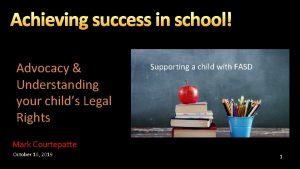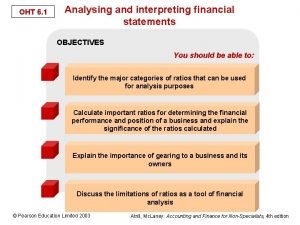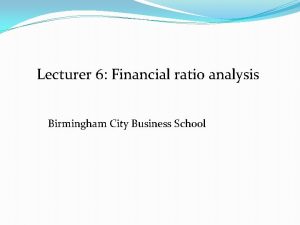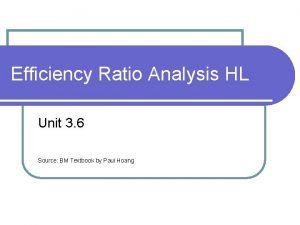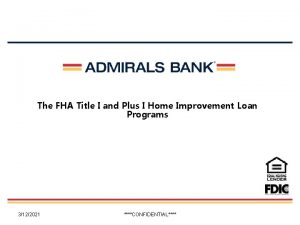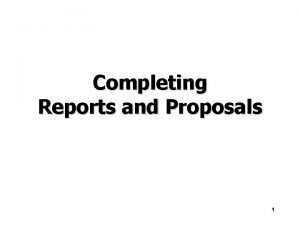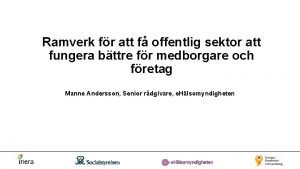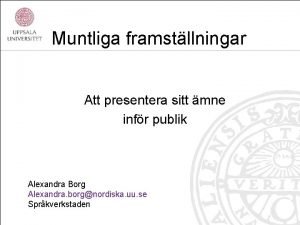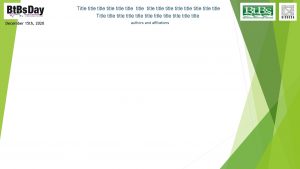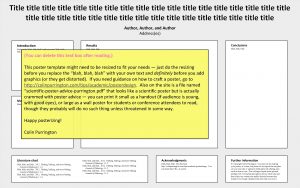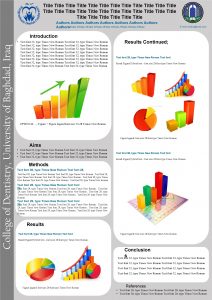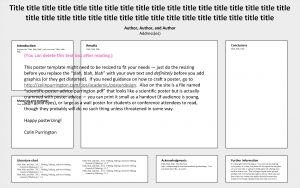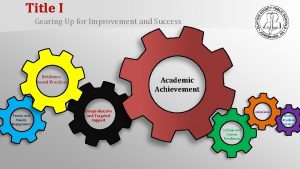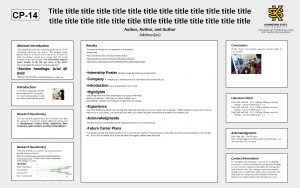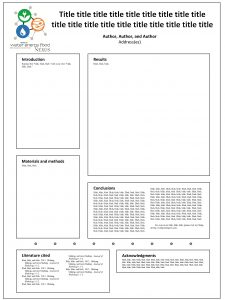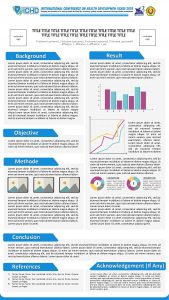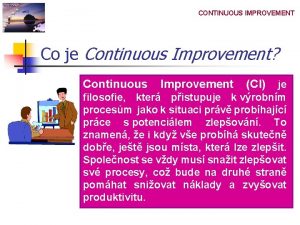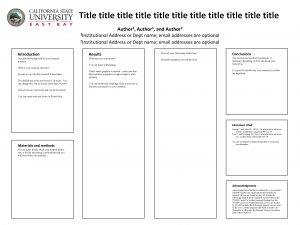Title I Gearing Up for Improvement and Success










































- Slides: 42

Title I Gearing Up for Improvement and Success Evidence. Based Practices Parent and Family Engagement Academic Achievement Comprehensive and Targeted Support Accountability College and Career Readiness Direct Student Services

Title I: Building Capacity for Faculty & Staff Presented by Title I Parent Liaison Ronkiesheal Meeks

Vision The vision of Clayton County Public Schools is to be a district of excellence preparing all students to live and compete successfully in a global society.

Mission The mission of Clayton County Public Schools is to be accountable to all stakeholders for providing a globally competitive education that empowers students to achieve academic and personal goals and to become college and career ready, productive, responsible citizens.

Strategic Goals Goal 3: To create an environment that promotes active engagement, accountability and collaboration of all stakeholders to maximize student achievement Goal 6: To recruit and retain highly qualified and effective staff

Expected Outcomes: 1. Explain the purpose and use of Title I and Title I Funds. 2. Build capacity for faculty and staff regarding parental involvement.

Elementary Secondary Education Act (ESEA) • • The Elementary and Secondary Education Act (ESEA) was signed into law in 1965 by President Lyndon Baines Johnson, who believed that "full educational opportunity" should be "our first national goal. " ESEA offered new grants to districts serving low income students, federal grants for text and library books, it created special education centers, and created scholarships for low income college students. Additionally, the law provided federal grants to state educational agencies to improve the quality of elementary and secondary education, as well as to increase parental involvement. Page cited: http: //www. ed. gov/esea • • In December 2015, the U. S. House of Representatives approved S. 1177, the Every Student Succeeds Act. The agreement reauthorizes the Elementary and Secondary Education Act (ESEA) of 1965 for four years, through FY 2020, replacing the widely criticized No Child Left Behind Act to end that law's federal accountability system and shift authority for academic standards and school accountability back to states and local school districts.

No Child Left Behind Act The No Child Left Behind Act (NCLB), which passed Congress with overwhelming bipartisan support in 2001 and was signed into law by President George W. Bush on Jan. 8, 2002, is the name for the most recent update to the Elementary and Secondary Education Act of 1965. The NCLB law —which grew out of concern that the American education system was no longer internationally competitive —significantly increased the federal role in holding schools responsible for the academic progress of all students. Info Cited from : http: //www. edweek. org/ew/section/multimedia/no child left behind overview definition summary. html

Every Student Succeeds Act The Every Student Succeeds Act (ESSA), The Every Student Succeeds Act (ESSA) was signed by President Obama on December 10, 2015. This bipartisan measure reauthorizes the 50 -year-old Elementary and Secondary Education Act (ESEA), the nation’s national education law and longstanding commitment to equal opportunity for all students. Info Cited from: http: //www. ed. gov/essa

Some Highlights of Every Student Succeeds Act ESSA includes provisions that will help to ensure success for students and schools. Below are just a few. The law: • Advances equity by upholding critical protections for America's disadvantaged and high-need students. • Requires—for the first time—that all students in America be taught to high academic standards that will prepare them to succeed in college and careers. • Ensures that vital information is provided to educators, families, students, and communities through annual statewide assessments that measure students' progress toward those high standards. • Helps to support and grow local innovations—including evidence-based and place-based interventions developed by local leaders and educators— consistent with our Investing in Innovation and Promise Neighborhoods • Sustains and expands this administration's historic investments in increasing access to high-quality preschool. • Maintains an expectation that there will be accountability and action to effect positive change in our lowest-performing schools, where groups of students are not making progress, and where graduation rates are low

Purpose of Title I serves to ensure that all children have a fair, equal, and significant opportunity to obtain a high quality education and reach, at a minimum, proficiency on challenging state academic achievement standards and state academic assessments.

Title I Eligibility Children eligible for free and/or reduced lunches under the National School Lunch Act. Some children are deemed automatically eligible to participate: Any student served in the Migrant Education Program; B. Any child who participated in Head Start, Even Start, the Early Reading First program, or Title I preschool services at any time within the previous two years; C. Any child attending a community day program or living in a state or local institution for neglected or delinquent children; and D. Any child who is homeless and attending any school in the LEA. A.

School-wide Title I • Aims to improve the entire educational program in a school. • 62 of our schools are School -wide Title I programs • Considerations still must be made on which students/areas are critical in terms of being at-risk.

School-wide vs. Targeted Assistance School-wide Assistance * Comprehensive site plan in which parents are invited to give input * The entire school benefits from Title I Targeted Assistance * Students are identified * Targets on students who are academically at risk of failing * Ranking system is utilized to see who will be served * Campuses with a low-income percentage of 35 -40% are considered a “targeted assistance” campus.

Uses of Title I Funds • • • Small group instruction Differentiated instruction Additional personnel Parental Involvement Professional Development Online Learning Take Home Resources Tutoring Supplemental Educational Services Supplementary materials to address student needs ~ Supplementary ~ a : something that completes or makes an addition. b : a part added to or issued as a continuation of. http: //www. merriam webster. com/

Supplemental Materials • • Technology Labs Wireless Laptop Carts i. Pod Carts Smart Tables Student Response Systems Class Libraries Parental Resources Instructional Supplies for students and teachers

Instructional Support • Schools can use their Title I funds to hire additional teachers and/or paraprofessionals. • Title I funded staff work directly with the classroom teacher to support at-risk students. • The Office of Federal Programs coordinates Tutorial Services for students who need additional support beyond the school setting. • Additional monitoring of these staff members will come from the Office of Federal Programs to ensure compliance.

No Parent Left Behind Parents are the key stakeholders in their children’s education. ESEA (Elementary and Secondary Education Act) legislation imposes new mandates for states, districts and schools with regards to Parental Involvement. NCLB provides opportunities for parents to actively participate in the educational process. • All Title I, Part A, campuses must use at least 3% of its Title I allocation to implement parent involvement activities, including the promotion of family literacy and parenting skills.

Six Types of Family Involvement

What Is A Title I School? Title I of the Elementary and Secondary Education Act of 1965 (20 U. S. C. 6301 et seq. ) is amended to read as follows: • Title I funds aim to bridge the gap between low income students and other students. The U. S. Department of Education provides supplemental funding to local school district to meet the needs of at risk and low income students. • Title I is the nation’s oldest and largest federally funded program, according to the U. S. Department of Education.

How Does Jonesboro High School Spend Title I Money? • Supplies • Personnel • PD Books & Conferences • Parent Resource Center • Professional Learning

How Does Jonesboro High School Participate in the Title I Program? • After school Remediation Program • Standards Based Tutorials • Parent Workshops

What is Required by Law for Parent Involvement? • Notification of Highly Qualified Teacher Status (Parent’s Right to Know) • Notification of School Status CCRPI Designation • 1% of System Allocation must be reserved for Parent Involvement

Our Parent Compact Please visit our JHS Title I Webpage: http: //002. clayton. k 12. ga. us/title_I

Parent Involvement Policy District Policy – Located on the District Website: http: //www. clayton. k 12. ga. us/cms/One. aspx? portal. Id=54515&p age. Id=94174 • School Policy – Located on the school website: http: //002. clayton. k 12. ga. us/title_I • School –Parent Compact – Copies sent home during the first 10 days – Additional copies are available upon request

How is Title I Parent Involvement Money Spent? Title I Budget Allocation: School SCHOOL CODE Jonesboro High Clayton County Public Schools 1% TITLE I, PI 1% Title I Parental Involvement Set Aside FY 17 FY 2017 Budget Detail PHONE AND FAX NUMBERS 002 770 -473 -2855 DATE 10/13/2016 PRINICPAL (PLEASE PRINT) PRINCIPAL'S SIGNATURE TOTAL ALLOCATION Felicia M Brown $ 3, 884. 00 ITEM NAME INDICATE HOW THIS ALLOCATION SUPPORTS YOUR SCHOOLWIDE PLAN / OBJECTIVES ITEM DESCRIPTION AMOUNT V. PARENTAL INVOLVEMENT -2100 1 Teachers Conducting PI Workshops After Duty Hours (199) Math Madness/Eyes on English-Preparation for EOC-GMAS Strategies to Increase Parental Involvement Instruction by Hi. Q Staff 2 Employee Benefits (220) Employee Benefits 3 Parent Involvement Outside Consultant (300) Wells Fargo-Inform parents how to save for post Activities/Programs Providing Effective Timely secondary college/careers/technical Assistance Paper, pencils, pens, parental brochures Strategies to Increase Parental Involvement 4 Parental Involvement Materials, Supplies, and Printing (610) 5 Expendable Equipment Computers Under $5, 000 (616) Parental books, periodicals, software, brochures Strategies to Increase Parental Involvement 6 Parental Involvement Books/Periodicals-Nontext (642) $ 1, 500. 00 $ 45 $ 539. 00 $ 1, 000. 00 $ - GRAND TOTAL $ 800. 00 $ 3, 884. 00

What Opportunities Are There for Parents To Be Involved at Jonesboro High School? • Parent Workshops • Parent Input Meetings(PIP, School Compact, 1% Budget) • Annual Title I Meetings • Parent Volunteer Opportunities • Parent Teacher Conferences

Parent Decision Making Opportunities • • School Council Title I School-wide Plan Title I Parental Involvement Policy Title I Parent Involvement Budget-1% Title I Survey (Fall and Spring) School-Parent Compact Revisions Teacher-Parent Conferences

Increasing Parent Involvement Opportunities

Fraud, Waste, Abuse, and Corruption Clayton County Public School employees shall be encouraged to report verbally or in writing to their supervisor, department head, or other appropriate authority, evidence of activity by a district department, agency, or employee constituting: 1. A violation of local, state, or federal law, rule or regulation; 2. Fraud; 3. Misappropriation of resources; 4. Substantial and specific danger to the public health and safety; or 5. Gross mismanagement, a gross waste of monies, or gross abuse of authority. All employees, board members, consultants, vendors, contractors and other parties maintaining a business relationship with the District shall act with integrity and due diligence in matters involving District fiscal resources. Further, it is the rule of this school district that employees be free of intimidation or harassment when reporting to public bodies about matters of public concern, including offering interviews or testimony before appropriate investigative, legislative, judicial, or quasi judicial authorities.

Fraud, Waste, Abuse, and Corruption cont. DEFINITION Fraud: As used in this policy, “fraud” refers to intentionally misrepresenting, concealing, or misusing information in an attempt to commit fiscal wrongdoing. Fraudulent actions include, but are not limited to: • Behaving in a dishonest or false manner in relation to District assets, including theft of funds, securities, supplies, or other District properties. • Forging or altering financial documents or accounts illegally or without proper authorization. • Improper handling or reporting of financial transactions. • Personally profiting as a result of insider knowledge. • Disregarding confidentiality safeguards concerning financial information. • Violating Board conflict of interest policies. • Mishandling financial records or District assets (destroying, removing or misusing). Waste: • The intentional or unintentional, thoughtless or careless expenditure, consumption, mismanagement, use, or squandering of district, state, or federal resources to the detriment or potential detriment of the district. Waste also includes incurring unnecessary costs as a result of inefficient or ineffective practices, systems, or controls.

Fraud, Waste, Abuse, and Corruption cont. Abuse: • Excessive or improper use of a thing, or to employ something in a manner contrary to the natural or legal rules for its use. Intentional destruction, diversion, manipulation, misapplication, maltreatment, or misuse of resources. Extravagant or excessive use as to abuse one’s position or authority. Abuse can occur in financial or non financial settings. Corruption: • Dishonest proceedings, bribery, debasement, alteration, or perversion of integrity which threaten equal access, quantity and quality of education. This includes, but is not limited to: • Neglect of duty or responsibility • Bribery • Concealing, facts or events regarding fraud, waste or abuse

Fraud, Waste, Abuse, and Corruption cont. STAFF RESPONSIBILITIES Employees who suspect that financial fraud, impropriety or irregularity has occurred shall immediately report those suspicions to their immediate supervisor and/or the Superintendent/designee, who shall have the primary responsibility for initiating necessary investigations. Investigations shall be conducted in coordination with legal counsel and/or other internal or external departments or agencies as appropriate. The Superintendent/designee shall inform all employees of the following anti-fraud regulations established by the Board: 1. The District shall operate in a climate of honesty and ethical behavior with employees doing all within their power to further that goal. 2. Employees shall comply with all state and federal laws, rules, regulations and court orders, as well as Board policy addressing fiscal matters. 3. Employees shall practice good stewardship of District financial resources, including timely reporting of fraudulent expenditures. 4. Employees with financial/accounting responsibilities shall support and follow sound business practices to the best of their ability and in keeping with their assigned responsibilities and job-related training by: a) b) c) d) e) f) Maintaining and protecting District financial records; Performing one’s job with the highest attention to detail to minimize and prevent error, falsification of accounting records, and omission of transactions; Reporting knowledge of fraud or suspected fraud, including intentional misstatements and omissions of amounts or disclosures; Guarding against misappropriation of assets; Refusing to reveal to unauthorized persons or agencies investment activities engaged in or contemplated by the District; and Resisting incentives, pressures, and negative attitudes that detract from performance of assigned responsibilities.

Fraud, Waste, Abuse, and Corruption cont. • • INTERNAL CONTROLS/INVESTIGATIONS The Superintendent/designee shall be responsible for developing internal controls to aid in preventing and detecting fraud or financial impropriety or irregularity within the District. Reports of suspected fraudulent activities shall be investigated in a manner that protects, to the extent possible, the confidentiality of the parties and avoids unfounded accusations. Employees involved in the investigation shall be advised to keep information about the investigation confidential except if disclosure is allowed by written consent of the employee. Employees who bring forth a legitimate concern or suspicion about potential impropriety shall not be retaliated against unless the disclosure was made with knowledge that disclosure was or was done with reckless disregard for its truth or falsity. Those who do retaliate against such an employee shall be subject to disciplinary action. If an investigation substantiates occurrence of a fraudulent activity, the Superintendent/ designee shall issue a report to appropriate personnel and to the Board of Education. Final disposition of the matter and any decision to file a criminal complaint or refer the matter to the appropriate law enforcement and/or regulatory agency for independent investigation shall be made in consultation with legal counsel. Results of the investigation shall not be disclosed to or discussed with anyone other than those individuals with a legitimate need to know until the results become subject to public disclosure in accordance with state law or federal law.

Complaints Procedure Clayton County Public Schools - Complaint Procedures under the Elementary and Secondary Education Act (ESEA) of 1965 A. Grounds for a Complaint Any individual, organization, or agency (“complainant”) may file a complaint with Clayton County Public Schools (CCPS) if that individual, organization, or agency believes and alleges that CCPS is violating a Federal statute or regulation that applies to a program under the Elementary and Secondary Education Act (ESEA). The complaint must allege a violation that occurred not more than one (1) year prior to the date the complaint is received, unless a longer period is reasonable because the violation is considered systemic or ongoing.

Complaints Procedure B. Federal Programs for Which Complaints Can be Filed 1. Title I, Part A: Improving Basic Programs Operated by Local Educational Agencies 2. Title I, Part C: Education of Migratory Children 3. Title I, Part D: Prevention and Intervention Programs for Children and Youth Who Are Neglected, Delinquent, or At Risk 4. Title II, Part A: Teacher and Principal Training and Recruiting Fund 5. Title III, Part A: English Language Acquisition, Language Enhancement, and Academic Achievement 6. Title IV, Part B: 21 st Century Community Learning Centers 7. Title VI, Part A, Subpart 1, Section 6111: State Assessment Program 8. Title VI, Part A, Subpart 1, Section 6112: Enhanced Assessment Instruments Competitive Grant Program 9. Title VI, Part B, Subpart 2: Rural and Low Income Schools 10. Title IX, Part E, Subpart 1, Section 9503: Complaint Process for Participation of Private School Children 11. Title X, Part C: Mc. Kinney Vento Homeless Assistance Act

Complaints Procedure C. Complaints Originating at the Local Level As part of its assurances within the ESEA program grant applications and pursuant to Section 9306 within the Title I, Part A of the ESEA, an LEA accepting federal funds also agrees to adopt local written procedures for the receipt and resolution of complaints alleging violations of law in the administration of covered programs. Therefore, for complaints originating at the local level, a complaint should not be filed with the Department until every effort has been made to resolve the issue through local written complaint procedures. If the complainant has tried to file a complaint at the local level to no avail, the complainant must provide the Department with written proof of his/her attempt to resolve the issue at the local level.

Complaints Procedure D. Filing a Complaint (from Receipt to Resolution) A complaint must be made in writing or submitted via the online Web complaint form and signed by the complainant. The complaint must include the following: 1. A statement that the Clayton County Public Schools has violated a requirement of a federal statute or regulation that applies to an applicable program. 2. The date on which the violation occurred. 3. The facts on which the statement is based and the specific requirement allegedly violated (include citation to the federal statute or regulation). 4. A list of the names and telephone numbers of individuals who can provide additional information. 5. Whether a complaint has been filed with any other government agency and, if so, which agency. 6. Copies of all applicable documents supporting the complainant’s position. 7. The address of the complainant. The complaint must be addressed to: Ms. Luvenia W. Jackson, Superintendent Clayton County Public Schools 1058 Fifth Avenue Jonesboro, Georgia 30236 Once the complaint is received by Clayton County Public Schools it will be copied and forwarded to the appropriate Federal Program Director/Coordinator.

Complaints Procedure E. Investigation of Complaint Within ten (10) days of receipt of the complaint, Clayton County Public Schools (CCPS) will issue a letter of acknowledgement to the complainant that contains the following information: 1. The date the Clayton County Public Schools received the complaint; 2. How the complainant may provide additional information; 3. A statement of the ways in which the Clayton County Public Schools may investigate or address the complaint; and 4. Any other pertinent information. • If additional information or an investigation is necessary, CCPS will have sixty (60) days from receipt of the information or completion of the investigation to issue a letter of findings. If the letter of findings indicates that a violation has been found, corrective action will be required and timelines for completion will be included. • The (sixty) 60 day timelines outlined above may be extended, if exceptional circumstances exist. The letter of findings will be sent directly to the complainant as well as the other parties involved.

Complaints Procedure F. Right of Appeal If an individual, organization, or agency is aggrieved by the final decision of Clayton County Public Schools, that individual, organization, or agency has the right to request review of the decision by the Georgia Department of Education. For complaints filed pursuant to Title IX, Part E, Subpart 1, Section 9503 (20 U. S. C. § 7883, complaint process for participation of private school children), a complainant may appeal Clayton County Public Schools’ decision to the Georgia Department of Education no later than thirty (30) days from the date on which the complainant receives the letter of findings. The appeal must be accompanied by a copy of Clayton County Public Schools’ decision and include a complete statement of the reasons supporting the appeal.

Quote of the Day

Office of Federal Programs Staff “Team FED” Katrina Thompson Director of Federal Programs Kephanie Dunn-Henderson Title I Programs Specialist Vikki Glover Title I Programs Specialist Wendy Petty Title I Programs Specialist Lori Miller Title I Programs Specialist Millicent Crews Title I Programs Specialist Delores Knight Title I Administrative Assistant Sonia Whitaker Title I Administrative Support Specialist
 Your child's success or lack of success
Your child's success or lack of success Your child's success or lack of success
Your child's success or lack of success How to improve current ratio
How to improve current ratio Return on ordinary shareholders equity formula
Return on ordinary shareholders equity formula Gearing ratios
Gearing ratios Classification of gears
Classification of gears Driver and driven gear
Driver and driven gear Cycloidal teeth consist of *
Cycloidal teeth consist of * Gearing up for safety
Gearing up for safety Gearing up for safety
Gearing up for safety Gearing up for the future (senior high school)
Gearing up for the future (senior high school) Gear ratio power
Gear ratio power Patterns of capital structure
Patterns of capital structure Draw frame
Draw frame Examples of block and tackle pulleys in real life
Examples of block and tackle pulleys in real life Gearing ratio
Gearing ratio Fha title 1
Fha title 1 Prefatory and supplementary part of proposal
Prefatory and supplementary part of proposal Title title
Title title Kontinuitetshantering i praktiken
Kontinuitetshantering i praktiken Typiska drag för en novell
Typiska drag för en novell Nationell inriktning för artificiell intelligens
Nationell inriktning för artificiell intelligens Vad står k.r.å.k.a.n för
Vad står k.r.å.k.a.n för Varför kallas perioden 1918-1939 för mellankrigstiden?
Varför kallas perioden 1918-1939 för mellankrigstiden? En lathund för arbete med kontinuitetshantering
En lathund för arbete med kontinuitetshantering Adressändring ideell förening
Adressändring ideell förening Tidböcker
Tidböcker Sura för anatom
Sura för anatom Vad är densitet
Vad är densitet Datorkunskap för nybörjare
Datorkunskap för nybörjare Tack för att ni lyssnade bild
Tack för att ni lyssnade bild Att skriva debattartikel
Att skriva debattartikel För och nackdelar med firo
För och nackdelar med firo Nyckelkompetenser för livslångt lärande
Nyckelkompetenser för livslångt lärande Påbyggnader för flakfordon
Påbyggnader för flakfordon Arkimedes princip formel
Arkimedes princip formel Publik sektor
Publik sektor I gullregnens månad
I gullregnens månad Presentera för publik crossboss
Presentera för publik crossboss Argument för teckenspråk som minoritetsspråk
Argument för teckenspråk som minoritetsspråk Bat mitza
Bat mitza Klassificeringsstruktur för kommunala verksamheter
Klassificeringsstruktur för kommunala verksamheter Epiteltyper
Epiteltyper

